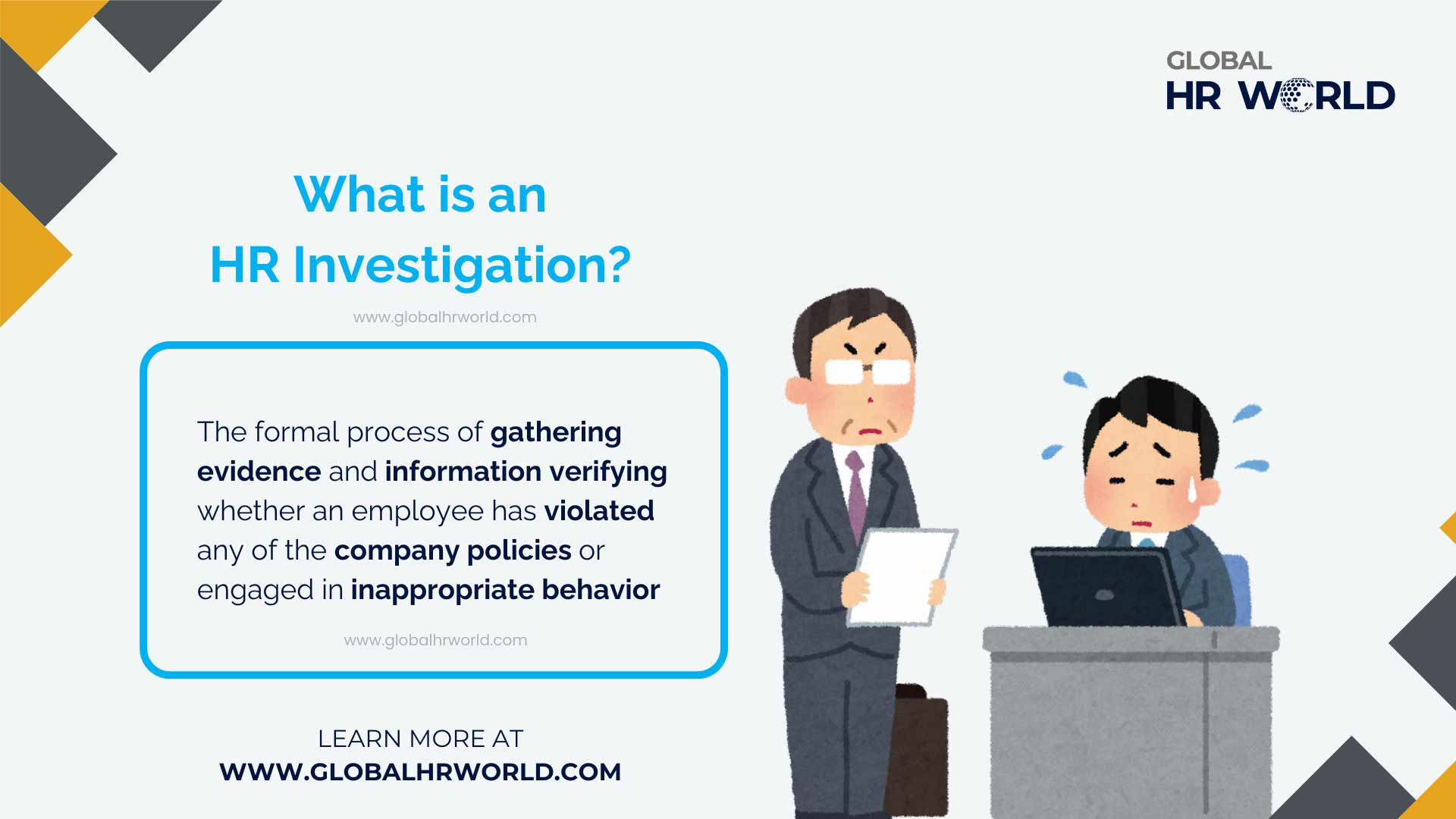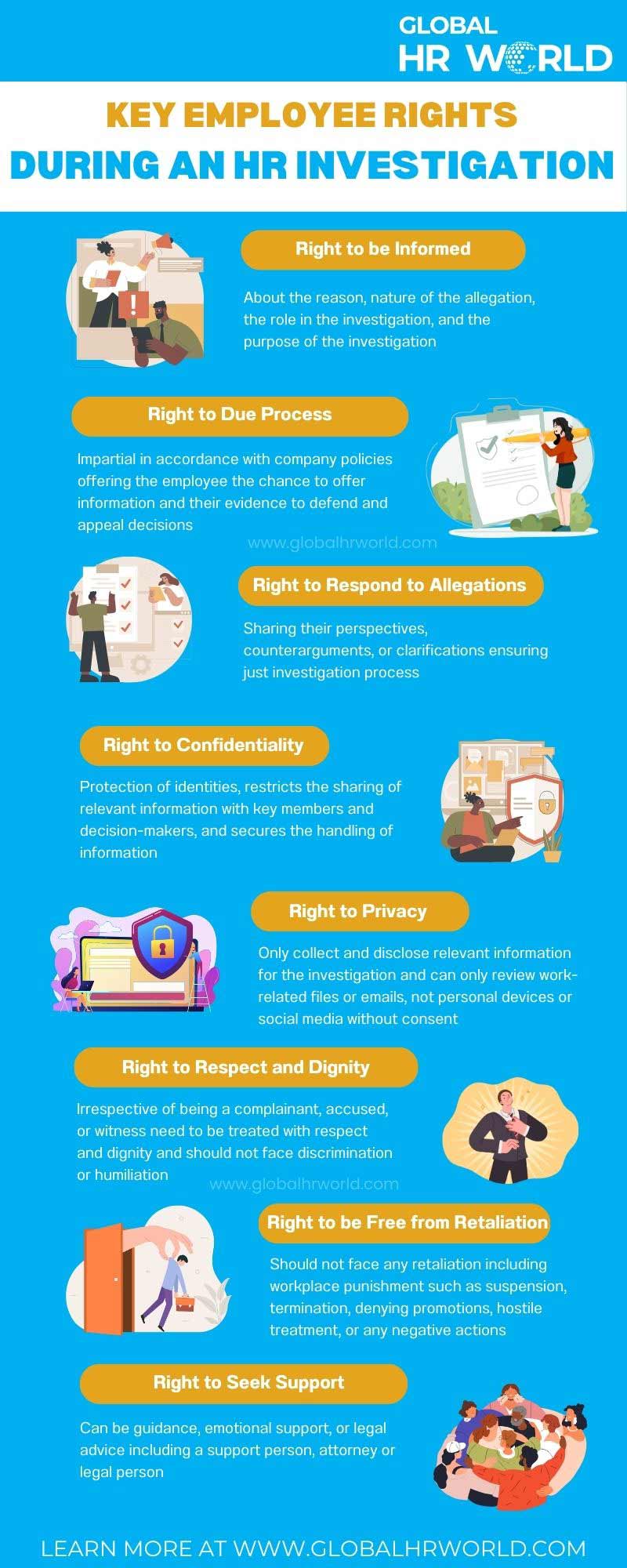Knowing employee rights during an HR investigation ensures fair treatment and protection against workplace injustices. HR investigation can raise uncertainty or stressful conditions for employees, but knowing their rights helps them participate in the process with confidence. This article explores the key employee rights during an investigation and the best practices to be followed during an HR investigation.
Understanding HR Investigation
Do you know that “just over half (52%) of employees have experienced or witnessed inappropriate, unethical or illegal behaviors at work?” (Source:2023 Workplace Harassment and Misconduct Insights Study). This showcases the need for sufficient investigations from the management to resolve the issues and ensure fair regulations. An HR investigation may be defined as the formal process of gathering evidence and information verifying whether an employee has violated any of the company policies or ‘engaged in inappropriate behavior’. The investigation typically begins when a complaint is filed or something significant happens to ensure the proper address of the conflicts, misconduct, or policy violations.

Typically, HR investigations are initiated when there are allegations of misconduct including harassment, discrimination, or bullying, suspicion or evidence of policy violations, employee misconduct, accidents and safety issues, and whistleblower reports on an issue. In addition to the objective of resolving issues, HR investigations are legal compliance and prevent further issues from occurring. The investigation process encompasses a step-by-step process of planning, gathering information, analyzing the evidence, drawing conclusions, documenting findings, developing recommendations, and implementing corrective actions. HR investigation processes are completed at the earliest to avoid the potential harm it can cause to both the employee and the company.
Key Employee Rights During HR Investigation
During an HR investigation, the employees have certain rights to protect themselves from unjust treatment or bias and ensure fair treatment whether being a complainant, accused, or a witness. The key employee rights during HR investigation are:
Employee Rights During HR Investigation #1: Right to be Informed
One of the fundamental employee rights during an HR investigation is to be informed about the reason, nature of the allegation, the role in the investigation, and the purpose of the investigation.
Employee Rights During HR Investigation #2: Right to Due Process
This employee right demands the investigation to be impartial in accordance with company policies offering the employee the chance to offer information and present their evidence to defend themselves and appeal decisions.
Employee Rights During HR Investigation #3: Right to Respond to Allegations
Amongst the employee rights during an HR investigation is the right to respond to allegations sharing their perspectives, counterarguments, or clarifications ensuring just investigation process.
Employee Rights During HR Investigation #4: Right to Confidentiality
Employees have the right to confidentiality, which ensures the protection of identities, restricts the sharing of relevant information with key members and decision-makers, and secures the handling of information. However, employees should be aware that confidentiality may not be possible for activities involving criminal treatment or serious regulatory violations.
Employee Rights During HR Investigation #5: Right to Privacy
Along with the right to confidentiality, employees have the right to privacy which affirms that HR should only collect and disclose relevant information for the investigation and can only review work-related files or emails, not personal devices or social media without consent.
Employee Rights During HR Investigation #6: Right to Respect and Dignity
Employees involved in the HR investigation irrespective of being a complainant, accused, or witness need to be treated with respect and dignity and should not face discrimination or humiliation due to their role in the investigation process.
Employee Rights During HR Investigation #7: Right to be Free from Retaliation
The HR investigation process should be transparent, and the employees should not face any retaliation including workplace punishment such as suspension, termination, denying promotions, hostile treatment, or any negative actions for their role in the investigation process.
Employee Rights During HR Investigation #8: Right to Seek Support
Employees in an HR investigation have the right to seek support, which can be guidance, emotional support, or legal advice. They can bring an attorney or a support person to the investigation meetings adhering to the company laws and policies. In case of legal protections or advice, they have the right to consult employment lawyers or legal organizations. Moreover, the employee can rely on mental health services such as Employee Assistance Programs (EAPs) or counseling for emotional support.
Employee Rights During HR Investigation #9: Right to Accommodation
If the employee involved in the investigation has any disabilities, medical conditions, or personal circumstances affecting their ability to hearings or related procedures. The accommodations must include a sign language interpreter, written responses, and adjusting the location or interview format depending on the physical disability. Moreover, accommodations related to mental health and well-being such as additional breaks during hearings, a support person if demanded by the employee, and a private setting for discussing sensitive issues.
Best Practices to Follow During an HR Investigation
When conducting an HR investigation, it is important to follow some best practices to ensure confidentiality and compliance with organizational policies. Here are a few of the best practices.
Communicate the Employee Rights Clearly
The employees should be aware of their rights to prevent uncertainties or stress associated with the investigation. The management must clearly communicate the employee right to respond, be free from retaliation, seek support, and ensure confidentiality and privacy.
Follow the Key Principles
When an HR investigation is being performed, confirm that the key principles such as fairness, confidentiality, timeliness, and documentation are being performed.
Take the Necessary Action
After the investigation is completed and the misconduct is confirmed, take the appropriate disciplinary measures aligning with company values.
Avoid Delays in the Investigation
Act promptly and avoid unnecessary delays in the investigation to prevent the loss of critical evidence, witnesses forgetting necessary details, and loss of trust in the organization. It is crucial to initiate the investigation immediately after the complaint is received and set clear timelines in the overall investigation process.
Conclusion
In a nutshell, HR investigation is the formal process of gathering evidence and information verifying whether an employee has violated any of the company policies or engaged in inappropriate behavior and is initiated with allegations of misconduct including harassment, discrimination, or bullying, suspicion or evidence of policy violations, employee misconduct, accidents, and safety issues, and whistleblower reports on an issue.
The employee rights during an HR investigation include the right to be informed, the right to due process, the right to respond to allegations, the right to confidentiality, the right to privacy, the right to respect and dignity, the right to be free from retaliation, the right to seek support, and the right to accommodation.
Following some best practices such as communicating the employee rights clearly, following the key principles of confidentiality, timeliness, fairness, and documentation, taking necessary actions following the investigation, and avoiding delays in the investigation is important to ensure justice and smooth conduct of the process. Organizations must conduct a well-executed HR investigation in cases of reported misconduct respecting employee rights and fostering a culture of trust, accountability, and integrity within the organization.
Infographic

Knowledge Check!
Frequently Asked Questions (FAQs)
What is an HR Investigation?
HR investigation is the formal process of gathering evidence and information verifying whether an employee has violated any of the company policies or engaged in inappropriate behavior.
When is an HR investigation needed?
An HR investigation is initiated with allegations of misconduct including harassment, discrimination, or bullying, suspicion or evidence of policy violations, employee misconduct, accidents, and safety issues, and whistleblower reports on an issue.
What are employee rights during HR investigation?
The employee rights during an HR investigation include the right to be informed, the right to due process, the right to respond to allegations, the right to confidentiality, the right to privacy, the right to respect and dignity, the right to be free from retaliation, the right to seek support, and the right to accommodation.



